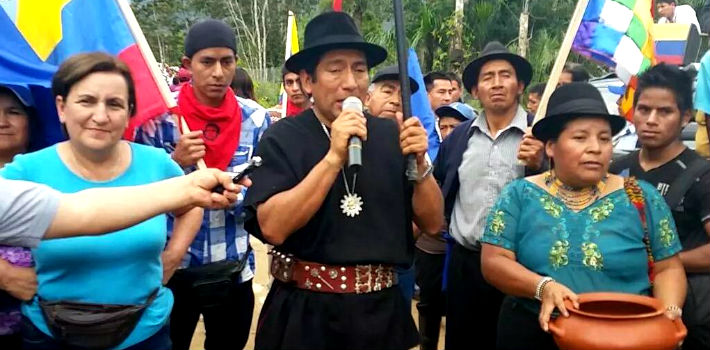
EspañolWary of an ever-growing state in Ecuador, several indigenous groups have joined a nationwide movement against the government of President Rafael Correa. To demonstrate their resolve, they have decided to embark on a 10-day march all the way from the Amazon to Correa’s office in Quito.
On Sunday, August 2, the 400-kilometer “March for Democracy and Dignity” convened by Ecuador’s Confederation of Indigenous Nationalities (CONAIE) departed from the town of El Pangui, in the southern Zamora Chinchipe province.
Before leaving, the demonstrators celebrated a ritual in which they prayed to Mother Earth for her permission and her blessing “to overcome all obstacles,” according to Salvador Quishpe, an indigenous opposition leader and Zamora Chinchipe governor for the Pachakutik party.
“We want peace, tranquility, respect, cordiality. That’s all we seek with this march: respect, above all, respect for the dignity of our history, our ancestors, our children — for the dignity of our peoples,” Quishpe told Efe news agency.
No to Indefinite Reelection

Moreover, the indigenous leaders signed the “mandate of the peoples of Cordillera del Cóndor.” The document asks for the shelving of constitutional amendments promoted by the ruling PAIS Alliance party, notably the one enabling indefinite reelection. They also call for the elimination of laws that restrict fundamental freedoms, for the respect of unions and workers rights, among other demands.
Jorge Herrera, president of CONAIE, stressed the peaceful nature of the protest and promised that on August 10 there will be a “great uprising of the peoples of Ecuador” throughout the South American nation.
The event, however, did not start without incidents. Herrera reported that a police checkpoint stopped five buses carrying people to the march, allegedly so the demonstrators could not get to the event on time. Undeterred, some travelers came out of the bus and walked to El Pangui, he said.
In an interview with Colombian outlet NTN24, Herrera assured that the Correa administration, after years of refusing to talk with them, is now “desperately” trying to set up a channel to negotiate.
#Ecuador: #Indigenous march of resistance against acts and omissions of the govt starts now from #Tundayme to #Quito. pic.twitter.com/fVulidESUB
— ubikitous (@PersonalEscrito) August 2, 2015
“During the eight and a half years that President Correa has remained in power, he has not been able to reach consensus … The only thing that Correa has done is lie. He has betrayed the ideological and political principles of this country … and he has been systematically restricting rights in Ecuador,” Herrera said, assuring that the indigenous groups will join the national strike convened by labor unions on August 13.
Meanwhile, certain indigenous groups that support the ruling party have rejected the demonstrations, alleging that the CONAIE leadership did not consult with all its members before launching the march.
“We reject [those supporters of] the right, who are taking advantage of social movements,” lashed out Delia Caguano, a coordinator of indigenous groups in Chimborazo and Sierra
On Saturday, Ecuadorian Vice President Jorge Glas took to Correa’s show Citizen Link on national television to attack the media for turning a blind eye towards indigenous groups that support PAIS Alliance. While citizens have the right to demonstrate, he said, he warned protesters not to block roads or destroy them.
He insisted that the Correa administration has worked in favor of indigenous groups, and repeated that the country needs a profound “dialogue.”
Ecuadorians escalated protests against the Correa administration in early June, after the president introduced legislation enacting new taxes on inheritance and capital gains. Thousands have since rallied to demonstrate with the slogan “fuera Correa, fuera” (get out Correa, get out!).
 Versión Español
Versión Español












